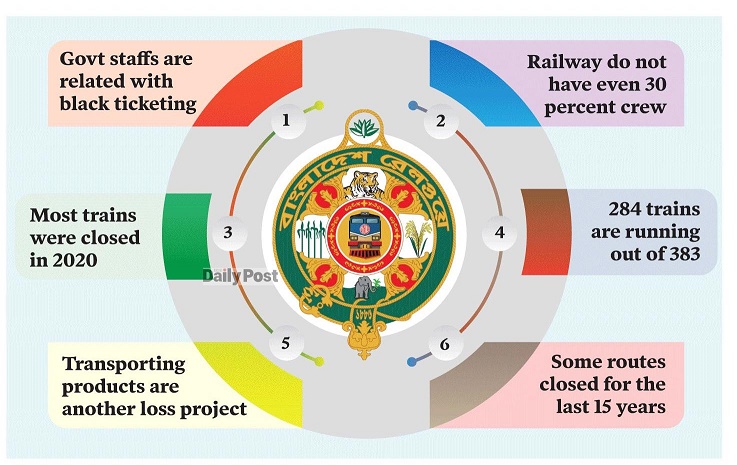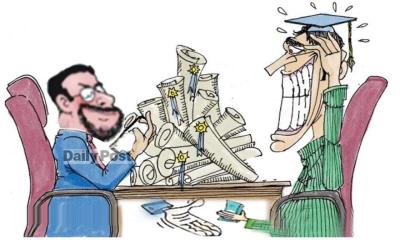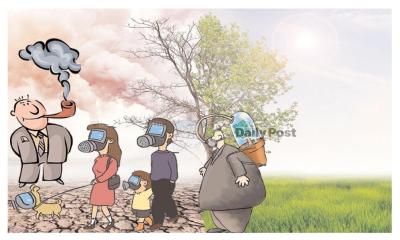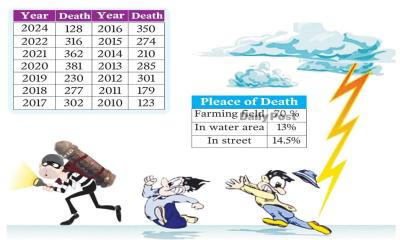# Most trains were closed in 2020
# Some routes closed for the last 15 years
# Only 284 trains are running out of 383
# Govt staffs are related with black ticketing.
# Railway do not have even 30 percent crew
# Transporting products are another loss project
To skip the loss in the Railway, the Interim govt has taken steps to make this ministry profitable and ease the trouble of mass people.
Steps are being taken to resume 93 second-class commuter trains of Bangladesh Railway, which was closed for a long time.
Although railway locomotives and coaches have been imported in the last decade, the resumption of second class commuter trains has been hampered due to various reasons. Despite those trains were not started due to various crises, new imported engines and coaches were used on unpopular routes due to political considerations.
In addition to giving more importance to the intercity express, those trains have been closed for the last 15 years due to the crisis of crew, manpower, engine and coach.
Railway officials-employees used to block railway tickets from a long time. Because of this, passengers had to suffer for tickets. From now on, no railway official-employee can block any ticket of any train verbally or by telephone, the advisor of the Ministry of Railways, Muhammad Fouzul Kabir Khan has instructed.
He said that train tickets are blocked verbally by railways. Henceforth, ticket distribution via verbal or telephone cannot be stopped. They are the cause of suffering with railway tickets. Action will be taken against those who block tickets. Tickets are also allotted from different stations. Now if it is not sold at one station it will be available from another station.
125 luggage vans were bought for Tk 358 crores 39 lakhs. Stay away from profit, on the contrary, income has decreased. Railways earned Tk 9 crore 91 lakh in the first eight months of last year from 51 luggage vans which are 40 years old. In the first eight months of this year, the income from new luggage vans was Tk 8.29 crore. Of the 125 vans added to the railway fleet in three phases from September to November last year, 47 are now running. Out of this, only one of the 25 air-conditioned (AC) refrigerator vans purchased for transporting fish, milk, eggs are being used.
The recently introduced railway baggage van service is also giving a boost to transport of agricultural produce. A train of six luggage vans transports 640 kg of vegetables and earns Tk a thousand and a half by burning Tk two lakh diesel from Khulna to Dhaka. The luggage vans from Panchagarh and Chapainawabganj did not bring even one kg of agricultural produce.
The survey was carried out under the Asian Clean Energy Fund under the Asian Development Bank (ADB) grant of $5 million under the name of Bangladesh Railway Rolling Operations Development Technical Support Project. In continuation of this, rolling stock operation improvement project was taken to buy 40 broad gauge engines, 75 meter gauge and 50 broad gauge luggage vans and 1000 wagons.
Amjad Hossain was the Director General (DG) of Railways when the project was approved. Shamsuzzaman was the DG at the time of tender and purchase agreement. There are several allegations against him, including the relaxation of the tender conditions for the purchase of 200 meter gauge bogies with the loan of ADB and the Indonesian company PT Inca being given the job. Two DGs have taken natural retirement from service.
ADB's loan for this project of Tk 3 thousand 602 crore is Tk 2 thousand 839 crore. On August 31, 2020, an agreement of Tk 358 crore 39 lakh was signed with a Chinese supplier for the purchase of vans. Each meter gauge luggage van costs Tk 2 crore 45 lakh. Broad gauge luggage vans cost Tk 3 crore 5 lakh each.
Dr Md Samshul Hoque of Buet said, “usage and revenue statistics of luggage vans are clear – there was no need to buy them. The name of the survey has been confirmed. But how did the Planning Commission and Prime Minister-led ECNEC approve these projects!'' The study, titled the Technical Assistance Scheme, said the purchase of luggage vans and wagons would increase capacity and income of goods transport.
He said that if those who have surveyed, verified, approved and implemented the project, are not brought under the responsibility of the embezzle will not stop. During the previous government, projects were taken for corruption. Let the current government set a precedent with the system. And ADB is a bank at the end of the day. They want to collect debt. Those who are in charge should understand.
The journey of the luggage van started on September 24 last year. Baggage van fare on Dhaka-Chittagong route is Tk 2.36 = per kg of goods. The fare for the other way is from Tk1.68 to Tk 2.94.
Eastern and Western Railway sources said that 26 out of 75 meter gauge luggage vans are in Chittagong port yard. There are 12 in the in shop. A total of 22 baggage vans are running including six in five intercity trains and 16 in four mail trains in the eastern region. Out of the eight sent to the western region, four are running. As such, 26 out of 75 vans are running. 14 out of 50 broad gauge luggage vans are running with intercity trains. Seven are running on the newly launched agricultural train. 47 vans are running in both regions. The rest are lying idle.
None of the 13 meter gauge refrigerator luggage vans are in use. It has been lying for a year since joining the fleet last October. A railway official said that there was no need to buy AC luggage vans. Even if there is no income from this, the foreign debt will have to be repaid after the end of the project period next year.
Railway officials said that luggage vans are usually fitted in mail-local trains. Platform length of most stations is shorter than that of intercity trains. Again, the inter-city train stops for two to five minutes at the station. It takes more time to move goods by train. Railways do not have engines to run only luggage vans. It is difficult to run passenger trains due to engine shortage. Without considering these, vans are bought just for 'commission'.
Each luggage van has a capacity of 10 tons. In the first eight months of this year, only 59 thousand 400 tons of goods were transported by vans. But the vans had the capacity to transport more goods. 70,900 tonnes of goods were transported in 40-year-old vans during the same period last year. After the addition of new vans, freight traffic has declined inversely.
Meanwhile, Railways is running 'Mango Special Train' from 2020 to transport mangoes. A loss of Tk 1 crore 82 thousand 860 has been incurred in mango transportation in four years. Still, the luggage van was bought because of the profit.
Muhammad Faozul Kabir Khan, Advisor-in-Charge of Ministry said, I will try to find and hold accountable those who wasted money by making unnecessary purchases in foreign loans.
Borhan Uddin, Project Director of Railway Ministry and Railway Luggage Van, said I am the sixth director of the project. The responsibility has been given at the end. Those who were in charge earlier, can tell how the survey was done.
Recently, the list of trains closed from the eastern and western regions of the railway has been collected. The list has already been sent to the Railway Bhavan. This information is known from Bangladesh Railway sources.
According to the sources, most of the trains were closed in 2020 during the Corona epidemic, includes a 50-year-old train. The authorities are now considering renovating them and introducing them as a second-class passenger service.
These include the Isha Khan Express on the Dhaka-Mymensingh route, which was introduced in 1972. The train stopped at least 34 stations in five districts. The working people of the vast haor region used to travel comfortably in the local train as well as transport daily goods. And the Jalalabad Express on the Chattogram-Sylhet route was one of the means of transportation for thousands of people of seven districts.
Besides, two trains used to run from Mymensingh to Dewanganj upazila of the neighboring district of Jamalpur in the morning and afternoon. Low-income people, including working people, students of educational institutions in divisional cities, were similarly dependent on the two trains. Local small traders were dependent on four trains from Sylhet to Sunamganj's Chhatak upazila route.
According to the timetable book of Bangladesh Railway, a total of 383 trains are supposed to run across the country. Of these, 212 are in the eastern region and 171 in the western region. But in reality, only 284 trains are running. All 99 trains are closed. Of these, 50 trains are in the eastern region and 49 in the western region.
Except for six trains on the western inter-country (Bangladesh-India route), all the trains closed are local, mail and commuter, second class. The railways needs more than 3,000 coaches and about 500 locomotives to run all the trains. But the railways currently has more than 2,500 coaches and more than 300 locomotives. But not all of those engines and coaches are moving. More than 50 percent of the engines and coaches have had a lifespan. Currently, the number of active coaches is more than 2,000 and there are only 200 working engines.
Of these, 1,131 coaches and 76 engines are operational in the eastern region. And in the western region, there are 890 coaches and 153 engines. However, a minimum of 116 engines and 1,500 coaches are needed to run all trains, including the closed trains in the eastern region. And in the western region, there are enough engines and coaches to run closed trains, but there are not enough crews.
Sources also said that there has been an acute manpower crisis in the railway for a long time. 30 percent of the demand is not crew or driver. After recruiting crews in the last few years, it was thought that the crisis would pass. But many have gone to other jobs after training with jobs. As a result, the crisis did not end. In such a situation, a proposal has been submitted to the ministry to resolve the crisis by recruiting the retired crew who are physically fit. If the ministry finalizes it, there may be some relief.
According to sources, about Tk 1 lakh crore has been spent in the last one decade for the development of the railway. Of this, about Tk 70,000 crore has been spent on the construction of railway lines, bridges, buildings and the purchase of engines and coaches. In the last one decade, about 800 coaches and only 30 locomotives have been added to the railway fleet. Heavy locomotives cannot run on old railway bridges without proper testing.
As a result, the engines cannot be used according to the demand. Initiatives have been taken to import 300 more engines. But it will take at least two years. Due to non-import of engines, coaches, the railways are not able to run trains as per the demand. As a consequence, the government is incurring a loss of more than Tk 2,000 crore annually in the railway sector.
Md Shahidul Islam, chief operating superintendent of Eastern Railway, said the transport department regularly gets 830 coaches and 63 engines to run trains in the eastern region. Due to the engine crisis, some train schedules are disrupted every day.
Director General of Bangladesh Railway Sardar Shahadat Ali said intercity train coaches and engines have been imported in the last one decade. As a result, it was not possible to add it to the second class train. It is being considered how to start the second class trains. The old coaches of the intercity train are being considered to be converted and started. Although the meter gauge (eastern) engine cannot be provided, some broad gauge (western) trains can be started.
ZH






